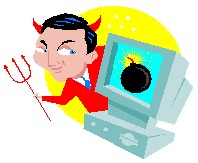
return
to newsletter 2002 issue 2
return
home

From: R.
Greg Thomas [mailto:rg-thomas@tamu.edu]
Sent: Saturday, May 11, 2002 9:13 AM Subject: Virus
Hoax
Colleagues,
The virus hoax e-mail messages seem to be intensifying as of late. Several of
the more recent are sent from an unknown source advising the recipient to
quickly delete a particular file from their computer. Since these contain no
virus code, this type of message will not be intercepted by our server based
virus scanning software. We can only rely on an informed clientele in avoiding
any potential damage to our information systems. The web sites listed below
should be referred to anytime you or one of your co-workers receive an e-mail
message concerning a questionable virus intrusion.
1. McAfee's Virus Information Library. http://vil.nai.com/vil/default.asp
2. HoaxBusters. This site is a public service of the US Department
of Energy. http://hoaxbusters.ciac.org/
3. About.com's Netlore: Rumors, Hoaxes & Urban Legends.http://urbanlegends.about.com/cs/nethoaxes/index.htm?once=true&
4. Spot scams at Internet ScamBusters. http://www.scambusters.org/
5. Virus hoax warnings. http://www.datafellows.fi/news/hoax.htm
6. Vmyths.com reveals the truth about computer-virus myths and
hoaxes. http://www.vmyths.com/
7. Symantec AntiVirus Research Center's virus encyclopedia. http://www.symantec.com/avcenter/vinfodb.html
8. ZDNet's virus help section. http://www.zdnet.com/filters/zdhelp/
Greg Thomas --Extension Computer Specialist - Texas Cooperative Extension
RG-THOMAS@TAMU.EDU
goto BUNNYRABBIT.com